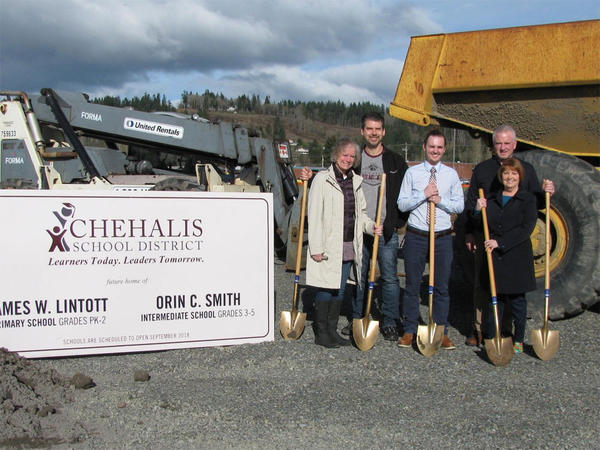
‘My Stomach Hurts’: Gridlock In Olympia Forces Superintendent To Delay School Construction
Listen
Washington state lawmakers have adjourned and gone home without passing a $4.1 billion capital construction budget. For a community in southwest Washington, that means an elementary school may not get built on time and on budget.
In Chehalis, one new elementary school is under constructionand a second one is ready to go to bid. But now the future is uncertain. That’s because the school district was counting on about $25 million in the state capital budget to help finish the first school and start the second.
The capital budget got caught up in a fight over rural water rights and the legislature adjourned its third special session on Thursday without addressing either issue.
With no capital budget Superintendent Ed Rothlin said he has to delay going out to bid for the second school.
“My stomach hurts to be quite honest with you,” Rothlin said as he contemplated not being able to deliver two new schools for his district.
Construction was supposed to start in August with the school opening in the fall of 2018. Any delay threatens that timeline and threatens to drive up the cost of the project.
Voters approved local bonds with the promise of matching state funds and a friend of the district donated the land for the schools to be built on.
“We don’t build schools in the Chehalis school district every other year,” Rothlin said. “So when taxpayers say ‘OK here’s some money,’ we want to be good for it.”
Statewide there are $122 million in so-called “non-front funded” school projects in nine counties that may not get off the ground until lawmakers pass a capital budget. That’s based on an analysis by the state Office of Financial Management.
Besides Chehalis, they include a planned renovation and expansion of East Valley High School in Yakima, according to the Yakima Herald.
All told, the capital budget includes approximately $1 billion for school construction, including money to complete projects that are already underway.
Some of that money was to be spent on building more classrooms to reduce K-3 class sizes and accommodate all-day kindergarten as required by the Washington Supreme Court in the McCleary school funding case.
The fact lawmakers did not pass a capital budget could be a factor when the Supreme Court decides later this year if the state is on a path to meet its constitutional duty to amply fund public schools.
In a 2014 order, the justices noted that districts don’t have the physical capacity to meet the smaller class size requirements.
“Make no mistake, enhanced funding for full-day kindergarten and class-size reduction is essential, but the State must account for the actual cost to schools of providing these components of basic education,” the justices wrote.
Lawyers for the plaintiffs in the McCleary case are likely to argue that the “actual cost” includes money to build additional classroom space.
9(MDEwMDE0NjgyMDEzNDY0NDY5NTBmNTc1Yg004))
Related Stories:

Intense fire week forces road closures and evacuation notices in WA
Fire crews continue firing wildfires to keep on high alert in the Northwest.

‘We’re just getting started’ | Haaland highlights major salmon recovery effort with $16M investment
U.S. Secretary of the Interior Deb Haaland celebrated with Gov. Jay Inslee, state, local, and Native American tribal leaders break ground at the new passage facility Wednesday, July 24, 2024

Boom Town: New Northwest-made podcast explores Western uranium mining and Hanford downwinders
Creator and host Alec Cowan’s shadow during a tour of the Sunday Mine Complex, a complex of five uranium mines in the Big Gypsum Valley near Paradox, Colorado, on Feb.












